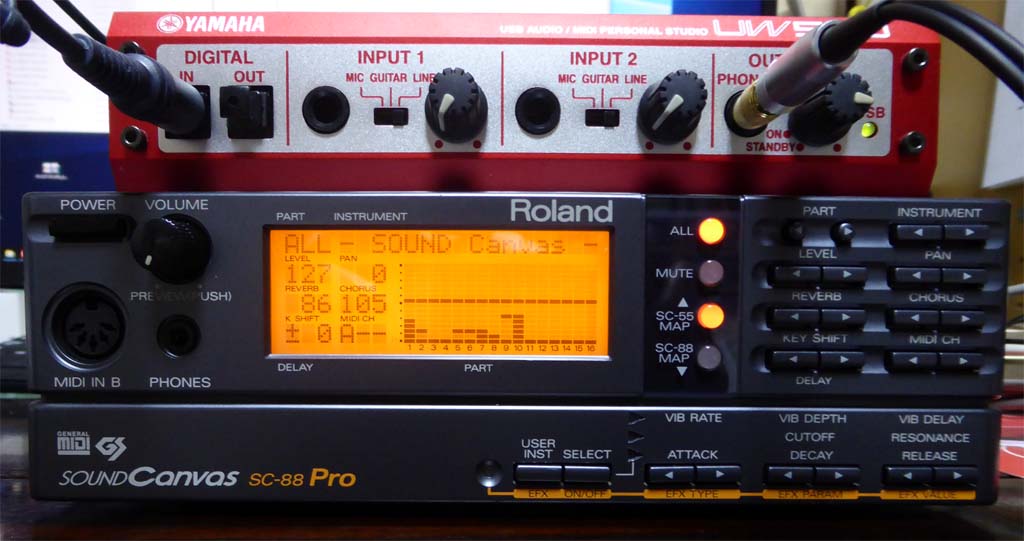もっと今更、SC-88ProにS/PDIFを付けよう
もっと今更、SC-88ProにS/PDIFを付けよう
STM32F103C8T6 ARM STM32 (blue pill)
- モデル:STM32F103C8T6
- コア:ARM 32 Cortex-M3 CPU
- 72MHz頻度を作動させる
- 64Kフラッシュメモリ、20K SRAM
- 2.0-3.6Vパワー、I/O
というやつ。

詳細はwikiの説明に
https://developer.mbed.org/users/peu605/code/DIT88proSTM32F1/wiki/説明
しまったなぁ、wikiのタイトル、漢字にしてしまったよ…
STM32F103C8T6, Roland, SC-88pro, S/PDIF, SPIDF, デジタル出力
Diff: main.cpp
- Revision:
- 3:bdac1803f0fd
- Parent:
- 2:62c8aa0c38c7
- Child:
- 4:c7c69c9b3cac
--- a/main.cpp Mon Sep 04 16:54:24 2017 +0000
+++ b/main.cpp Tue Sep 05 11:06:55 2017 +0000
@@ -71,11 +71,12 @@
int main()
{
+ // change to 72MHz
SystemClock_Config();
-
+
setupPeripherals();
setChannelStatus();
-
+
HAL_Delay(1000);
// enable SPI and deselect
@@ -95,10 +96,11 @@
// wait for interrupt
while (true) {
+ __WFI();
+
#ifdef _DEBUG_CONSOLE
debugOut();
#endif
- __WFI();
}
}
@@ -106,16 +108,16 @@
void transferFrames()
{
-
- // measured load is 20.8%
+
+ // measured load is 18.6% at 72MHz
_LED_OFF(); // PC_13 to HIGH
-
+
for (uint32_t i = 0; i < BUFFER_NUM_FRAMES / 2; ++i) {
transferFrame();
}
-
+
_LED_ON(); // PC_13 to LOW
-
+
}
@@ -152,11 +154,11 @@
static bool lastCellZero = true;
// static uint32_t spiDelay = 0;
-
+
// ======================================
// Read rx buffer and make raw SPIDF data
// ======================================
-
+
// Roland SC-88pro, 256fs, 18bit right justified, MSB first
// SC-88pro's output format seems to be 2's complement 18 bit audio data in 20 bit data frame.
//
@@ -180,15 +182,17 @@
// 1111 ... 0000000 1111110000000000 1111110000000000
// 5432 6543210 5432109876543210 5432109876543210
//
- // bit[127:20] is all 0 or all 1.
+ // bit[127:20] is all 0 or all 1. SDO keeps last LSB state.
//
// bit[31:20] should be 000...00 or 111...11
// bit[19:0] MSB to LSB, 2's complement 18 bit audio data in 20 bit data frame
-
+ //
+ // measured spiDelay is 2 to 4
+
// arithmetic right shift
int32_t val = (*(rxBuffPtr + 6) << 16) | *(rxBuffPtr + 7);
val >>= spiDelay;
-
+
// determine spiDelay
while(true) {
int32_t test = val & MASK31_20;
@@ -205,15 +209,15 @@
}
}
}
-
- // left shift to fit 24 bit width
+
+ // left shift to fit 24 bit width, adding zero
val <<= (24 - SDATA_LENGH);
// 4-27 data, 28 V, 29 U, 30 C, 31 P
// U = 0
// 'val' here does not have preamble.
// So, V position is (28 - 4), C pos is (30 - 4), and P pos is (31 - 4).
-
+
// mask with 24 bit to clear VUCP bits
val &= MASK23_0;
@@ -249,13 +253,17 @@
// First, 0 ~ 4 bit is Preamble. Not BMC!
uint16_t bmc;
if (!aCh) {
+ // b channel
bmc = lastCellZero ? PREAMBLE_Y : ~PREAMBLE_Y;
} else if (frameIndex == 0) {
+ // a channel, frame 0
bmc = lastCellZero ? PREAMBLE_Z : ~PREAMBLE_Z;
} else {
+ // a channel, frame != 0
bmc = lastCellZero ? PREAMBLE_X : ~PREAMBLE_X;
}
- lastCellZero = !(bmc & 1); //lastCellZero = (bmc & 1) == 0;
+// lastCellZero = !(bmc & 1);
+ lastCellZero = (bmc & 1) == 0;
*txBuffPtr++ = bmc;
// Next, 5 ~ 31 bit, audio data and VUCP bits. 28/4 = 7 loops
@@ -263,7 +271,8 @@
for (uint32_t i = 0; i < 7 ; ++i) {
bmc = lastCellZero
? bmcTable[val & 0x0f] : ~bmcTable[val & 0x0f];
- lastCellZero = !(bmc & 1);
+// lastCellZero = !(bmc & 1);
+ lastCellZero = (bmc & 1) == 0;
*txBuffPtr++ = bmc;
val >>= 4;
}
@@ -344,29 +353,55 @@
*str = '\0';
}
+
#ifdef _DEBUG_CONSOLE
-uint16_t tmpData[8];
-char str[17];
-Serial pc(PA_2, PA_3);
-
void debugOut()
{
+ static char str[17];
+ static Serial pc(PA_2, PA_3);
+
// pc.printf("SystemCoreClock =%d\n", SystemCoreClock);
- for (uint8_t i = 6; i < 8; ++i) {
- tmpData[i] = spiRxBuff[0].ltCh[i];
+/*
+ // dump raw data
+ uint16_t tmp = spiRxBuff[0].ltCh[6];
+ toBinary(&tmp, (char*) &str);
+ pc.printf("Delay:%02d %s ", spiDelay, str);
+ tmp = spiRxBuff[0].ltCh[7];
+ toBinary(&tmp, (char*) &str);
+ pc.printf("%s\n", str);
+ HAL_Delay(200);
+*/
+
+ // dump shifted data
+ int32_t val = (spiRxBuff[0].ltCh[6] << 16) | (spiRxBuff[0].ltCh[7]);
+ val >>= spiDelay;
+ uint16_t tmp = (val & 0xffff0000) >> 16;
+ toBinary(&tmp, (char*) &str);
+ pc.printf("Delay:%02d %s ", spiDelay, str);
+ tmp = val & 0xffff;
+ toBinary(&tmp, (char*) &str);
+ pc.printf("%s\n", str);
+ HAL_Delay(200);
+
+/*
+ // find loud 18bit data
+ int32_t val = (spiRxBuff[0].ltCh[6] << 16) | (spiRxBuff[0].ltCh[7]);
+ val >>= spiDelay;
+ uint16_t tmp = (val & 0xffff0000) >> 16;
+ if ((tmp & 0b1111) == 0b1110 || (tmp & 0b1111) == 0b0001) {
+ toBinary(&tmp, (char*) &str);
+ pc.printf("Delay:%02d %s ", spiDelay, str);
+ tmp = val & 0xffff;
+ toBinary(&tmp, (char*) &str);
+ pc.printf("%s\n", str);
}
- pc.printf("Delay:%02d", spiDelay);
- for (uint8_t i = 6; i < 8; ++i) {
- pc.printf(" ");
- toBinary(&tmpData[i], (char*) &str);
- pc.printf(str);
- }
- pc.printf("\n");
- HAL_Delay(200);
+*/
+
}
#endif
+
/**
* @brief System Clock Configuration
* The system Clock is configured as follow :
@@ -384,12 +419,14 @@
*/
void SystemClock_Config(void)
{
+ HAL_RCC_DeInit();
+ // not implemented yet?
+// LL_RCC_DeInit();
/* Set FLASH latency */
LL_FLASH_SetLatency(LL_FLASH_LATENCY_2);
/* Enable HSE oscillator */
-// LL_RCC_HSE_EnableBypass();
LL_RCC_HSE_Enable();
while(LL_RCC_HSE_IsReady() != 1) {
};
@@ -416,15 +453,15 @@
/* Update CMSIS variable (which can be updated also through SystemCoreClockUpdate function) */
LL_SetSystemCoreClock(72000000);
-
- // 本当に72MHzかなぁ…
+ // re-set baud rate.
+// pc.baud(9600);
}
void setupPeripherals()
{
-
+
// enable GPIOB/C clock
LL_APB2_GRP1_EnableClock(LL_APB2_GRP1_PERIPH_GPIOB);
LL_APB2_GRP1_EnableClock(LL_APB2_GRP1_PERIPH_GPIOC);